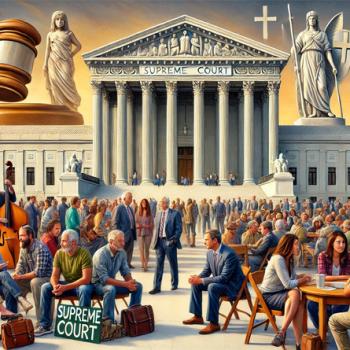Brad DeLong linked to this post from Cogitamus celebrating George Washington's 1790 letter to the Hebrew Congregation of Newport, R.I.
I hadn't read this before, partly, I suppose, due to some parochial Baptist fixation on Thomas Jefferson's 1802 Letter to the Danbury Baptists that kept me from reading any other correspondence between early presidents and the religious minorities of New England.
Washington's letter is just as unambiguous and forceful. And it may be a more useful tool for arguing with my brothers and sisters on the religious right who view Jefferson with suspicion but are unqualified in their worship of Washington.
For those who, like me, have spent years wrestling with lying revisionists like David Barton and Glenn Beck and are therefore reflexively skeptical of any citation of any Founding Father on the subject of religion, here is some background on the authenticity of Washington's letter to the Newport congregation and here is the letter itself, in Washington's own hand, from the Library of Congress.
The text of the letter:
While I received with much satisfaction your address replete with expressions of esteem, I rejoice in the opportunity of assuring you that I shall always retain grateful remembrance of the cordial welcome I experienced on my visit to Newport from all classes of citizens.
The reflection on the days of difficulty and danger which are past is rendered the more sweet from a consciousness that they are succeeded by days of uncommon prosperity and security.
If we have wisdom to make the best use of the advantages with which we are now favored, we cannot fail, under the just administration of a good government, to become a great and happy people.
The citizens of the United States of America have a right to applaud themselves for having given to mankind examples of an enlarged and liberal policy—a policy worthy of imitation. All possess alike liberty of conscience and immunities of citizenship.
It is now no more that toleration is spoken of as if it were the indulgence of one class of people that another enjoyed the exercise of their inherent natural rights, for, happily, the Government of the United States, which gives to bigotry no sanction, to persecution no assistance, requires only that they who live under its protection should demean themselves as good citizens in giving it on all occasions their effectual support.
It would be inconsistent with the frankness of my character not to avow that I am pleased with your favorable opinion of my administration and fervent wishes for my felicity.
May the children of the stock of Abraham who dwell in this land continue to merit and enjoy the good will of the other inhabitants—while every one shall sit in safety under his own vine and fig tree and there shall be none to make him afraid.
May the father of all mercies scatter light, and not darkness, upon our paths, and make us all in our several vocations useful here, and in His own due time and way everlastingly happy.
G. Washington
The fourth and fifth paragraphs there are the one I will be committing to memory in order to have them at my disposal the next time I'm engaged with a Bartonite theocrat, a Gingrichian sectarian, a Beckian or Breitbartian white supremacist, or with any other similar group arguing the opposite of what Washington says when he defines America as a nation wherein:
All possess alike liberty of conscience and immunities of citizenship. It is now no more that toleration is spoken of as if it were the indulgence of one class of people that another enjoyed the exercise of their inherent natural rights.
Good stuff, that.
During Washington's presidency, of course, most Americans did not "possess alike liberty of conscience and immunities of citizenship." The man who wrote "to bigotry no sanction" also imagined he had the right to own other humans and the authority to vote on Martha's behalf. But yet we can see here in Washington's own words the inevitable, inexorable trajectory leading toward the 13th, 14th, 15th and 19th Amendments.
Deprive any minority — whether a religious minority, an a-religious minority, a disenfranchised gender or ethnic group or race or sexual orientation — of the liberty of conscience and immunities of citizenship and you will have diminished liberty, devaluing it into mere "toleration," the condescending and conditional "indulgence" of the privileged ruling class. Screw that.
"To bigotry no sanction, to persecution no assistance."
Ok, then.

















